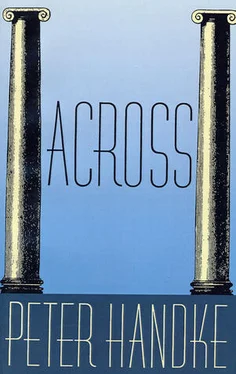Peter Handke - Across
Здесь есть возможность читать онлайн «Peter Handke - Across» весь текст электронной книги совершенно бесплатно (целиком полную версию без сокращений). В некоторых случаях можно слушать аудио, скачать через торрент в формате fb2 и присутствует краткое содержание. Год выпуска: 2000, Издательство: Farrar, Straus and Giroux, Жанр: Современная проза, на английском языке. Описание произведения, (предисловие) а так же отзывы посетителей доступны на портале библиотеки ЛибКат.
- Название:Across
- Автор:
- Издательство:Farrar, Straus and Giroux
- Жанр:
- Год:2000
- ISBN:нет данных
- Рейтинг книги:3 / 5. Голосов: 1
-
Избранное:Добавить в избранное
- Отзывы:
-
Ваша оценка:
- 60
- 1
- 2
- 3
- 4
- 5
Across: краткое содержание, описание и аннотация
Предлагаем к чтению аннотацию, описание, краткое содержание или предисловие (зависит от того, что написал сам автор книги «Across»). Если вы не нашли необходимую информацию о книге — напишите в комментариях, мы постараемся отыскать её.
Across — читать онлайн бесплатно полную книгу (весь текст) целиком
Ниже представлен текст книги, разбитый по страницам. Система сохранения места последней прочитанной страницы, позволяет с удобством читать онлайн бесплатно книгу «Across», без необходимости каждый раз заново искать на чём Вы остановились. Поставьте закладку, и сможете в любой момент перейти на страницу, на которой закончили чтение.
Интервал:
Закладка:
The other card players were a priest, a young politician, a painter, and the master of the house. They were sitting in the library, a room almost bare except for books. The knotholes in the wide floorboards seemed at first sight to move in the cigar smoke. The legs of the light maplewood table, as the priest explained in the pause produced by my arrival, formed a St. Andrew’s cross, so called after the apostle Andrew, who had suffered martyrdom on an X-shaped cross. The name Andreas — which happens to be mine — aroused laughter and led quite naturally to my joining in the game. As if I hadn’t been late at all, I sat at the table, fanning out my cards.
Before that, I had stood a while on the threshold of the house. This threshold consisted of round stakes of varying thicknesses, each with its specific annual rings, pounded up to their heads into the ground, the whole giving the impression of interlocking wheels, or rather, because of the radial cracks in the wood, of juxtaposed sun disks, framed on the right and left by the dark green lanceolate tips of oleander bushes. Threshold and oleander were lit by a spotlight affixed to the lintel, as an indication that this was the scene of the card game. “Threshold, play on,” read the old-fashioned writing on the door. And: “Card game, lead us.”
A few of the painter’s pictures hung on the window-side wall, where there were no books. Unframed and unglassed, they seemed to be emanations of the wall itself. A rust-brown, a saltpeter-gray, a mold-silver, a brick-red, a resin-yellow. Unlike other pictures, they did not draw the eye to a point but merely reflected colors. These, said the painter, “should be as luminous as the colors in a stained-glass window; that is my ideal.” Though he had lived in the city a long time, he was the stranger to the group. His eyes were invisible, so deeply embedded that their sockets rather resembled the eye-holes in a mask. Sometimes his voice was like that of a child, soft and matter-of-fact; and he never had to clear his throat before starting to speak. He kept holding up the game by discovering in each card dealt him a certain color providing the basis for a lengthy discussion. (Or he would bend down to the carpet and appear to be rubbing its wine red and cobalt blue into his face as a kind of war paint.) He was so short that his head barely rose above the edge of the table. He always stood up to deal. His tricks had to be pushed over to him.
The stairwell had smelled of apples, as strongly as a fruit cellar. The aroma was lost in the room where we were playing but became all the more pungent if one stepped outside. At times, moreover, one caught a whiff, though through a barrier of baffling admixtures, of spices from the food simmering in the kitchen below, to which our host turned his attention whenever he was out of the game: thyme? savory? cinnamon? Once, when the window was opened for a moment, someone was heard to say: “You can smell the snow he predicted.” “He” was the weather broadcaster.
The house was not quiet. Time and again, steps were heard on the winding stairs which led not only to the library but also to the various bedrooms; among them a swift, light scurrying as of an animal’s paws. Then there was a scratching at the outside door, and someone admitted a cat, which lay under the table during the rest of the game. It had a dark head, with yellow eyes; when the eyes were closed, the whole head was black.
In a basement room, a cello was being played, a heavy, long-drawn-out rumbling, which, in a manner of speaking, gave the whole house a musical foundation. The cello notes made the time pass more slowly; almost everyone who went by the house stopped to listen; and sometimes the players inside suspended their movements, as though for them, under the spell of Orpheus’ voice, things had stopped moving for a while. At the same time it was ship’s music; the library with its paneled ceiling was the salon, and the little oval windows in the gable were the portholes.
The cello fell silent. A bottle of wine was uncorked. The telephone rang in the entrance hall (“Not for me,” said the master of the house, while someone who could not have been an adult ran down the stairs). In the dark garden, the evergreen leaves of a holly tree glistened; the dull-black shape in it was a sleeping blackbird. A single stone lion, no larger than a hare, crouched on a pedestal near the garden gate. Down in the city, people were besieging the one open shop where cigarettes and newspapers were available. The trains at the railroad station looked colorful and massive, like components of the big cities they had come from or were going to; the tracks were a recumbent pyramid. And far from the station, the broken bottles atop the prison wall suggested pyramids of a very different kind.
Our game on the mountainside was fitful. If one player let his thoughts wander, did that suffice to make the others lose interest? Yet we were all serious about the game. I had seldom played so resolutely and I persisted in playing every hand. But there was no joy in it; only a dogged determination to win. And we couldn’t stop. Instead of becoming, as usual, more intimate as the game went on, we became more estranged. None of us could look his partner in the eye. We observed the rules punctiliously, yet our looks and gestures were those of cheats; and to cheat in this way is to play at playing. A lost feeling came over us. We all felt out of place. And in the place where we should have been long ago, “everything was too late.” On the one hand, five lost card players were on the verge of tears; on the other hand, each went on doing, and overdoing, his own thing: the master of the house kept pouring more wine; the painter, at every glance, discovered and exclaimed about some new color in the room (for instance, those spots of mold on the spine of a book); and the priest, in his capacity as a recognized authority on tarok, author of a treatise on the history of the game in the various countries of Europe, surprised the company by invoking weird and unusual exceptions and sub-exceptions to the rules (though these did not always work in his favor).
Only the politician tried, so to speak, to make the wind change. He proceeded as though he were responsible for the evening, which for him was not just another evening but a time of testing. Especially in his leisure hours, he always felt called upon to prove himself, to show that he could handle any situation. He would jump at the slightest opportunity to demonstrate his capacity for immediate action. If a mouse was sighted, he was the one to wake the sleeping cat and put it on the scent; if a glass fell to the floor, he would instantly block off the disaster zone where splinters threatened — and signal like a traffic cop to the person who arrived with dustpan and brush. Where others were panicked or hesitant, he was in his element. At present, to be sure, his determination that every moment should demonstrate his leadership, energy, and competence only made matters worse. He spoke and moved as though trying to take charge in an overcrowded lifeboat: with an enormous display of muscle, he tries to start the dead engine, and succeeds only in flooding it, while at the same time belaboring the faces and bellies of those to the right and left of him with his elbows, until, with all the fumbling and floundering, the boat threatens to capsize. To reconcile the players, he looked for resemblances. For instance, he found a resemblance in the way the master of the house and the painter put their glasses down after every sip; he discovered that the eyeglasses of the priest and of the master of the house were the same strength; and I, “the teacher,” had in common with him, the politician, if not his political party, at least the habit of pounding my cards with my fist instead of picking them up.
Читать дальшеИнтервал:
Закладка:
Похожие книги на «Across»
Представляем Вашему вниманию похожие книги на «Across» списком для выбора. Мы отобрали схожую по названию и смыслу литературу в надежде предоставить читателям больше вариантов отыскать новые, интересные, ещё непрочитанные произведения.
Обсуждение, отзывы о книге «Across» и просто собственные мнения читателей. Оставьте ваши комментарии, напишите, что Вы думаете о произведении, его смысле или главных героях. Укажите что конкретно понравилось, а что нет, и почему Вы так считаете.












